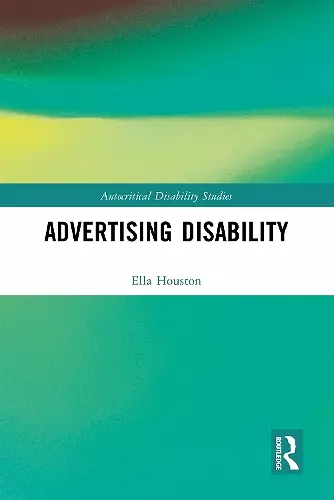Advertising Disability
Format:Hardback
Publisher:Taylor & Francis Ltd
Published:3rd Jun '24
Should be back in stock very soon

Advertising Disability invites Cultural Disability Studies to consider how advertising, as one of the most ubiquitous forms of popular culture, shapes attitudes towards disability.
The research presented in the book provides a much-needed examination of the ways in which disability and mental health issues are depicted in different types of advertising, including charity 'sadvertisements', direct-to-consumer pharmaceutical advertisements and 'pro-diversity' brand campaigns. Textual analyses of advertisements from the eighteenth century onwards reveal how advertising reinforces barriers facing disabled people, such as stigmatising attitudes, ableist beauty 'ideals', inclusionism and the unstable crutch of charity.
As well as investigating how socio-cultural meanings associated with disability are influenced by multimodal forms of communication in advertising, insights from empirical research conducted with disabled women in the United Kingdom and the United States are provided. Moving beyond traditional textual approaches to analysing cultural representations, the book emphasises how disabled people and activists develop counternarratives informed by their personal experiences of disability, challenging ableist messages promoted by advertisements. From start to finish, activist concepts developed by the Disabled People's Movement and individuals' embodied knowledge surrounding disability, impairments and mental health issues inform critiques of advertisements.
Its critically informed approach to analysing portrayals of disability is relevant to advertisers, scholars and students in advertising studies and media studies who are interested in portraying diversity in marketing and promotional materials as well as scholars and students of disability studies and sociology more broadly.
Advertising Disability is truly a significant and much-needed book because it reminds CDS scholars and media studies scholars not to forget advertising content about disability in their research. Persuasive media like advertising impacts the way billions of people have seen disability for many decades. Houston calls for the advertising industry to shift its structure to better include disabled consultants or disabled employees in the creation of ads so the industry can have campaigns that embrace the disability rights mantra of “nothing about us without us.” In addition to the inclusion of disabled people in the creative process, Houston challenges the advertising industry to reject tokenism and ableist aesthetics in favor of diverse and authentic representations of disabled people with and without apparent disabilities. The book also creates a methodology for analyzing advertising and social media marketing that is informed by the lived experiences of disability activists, who can share their embodied understanding of disability, impairments, and mental health issues.
Beth Haller
Towson University
"A key text for our current age of marketing and mass media"
Saul Leslie
ISBN: 9781032560229
Dimensions: unknown
Weight: 440g
146 pages